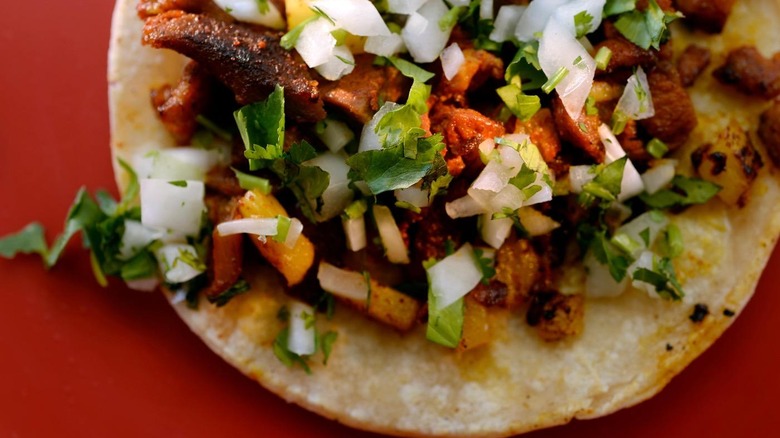The Truth Behind Tacos Al Pastor
A taco and a shawarma walk into a bar . . .
Those pineapple-and-pork tacos served on almost every street corner in every Mexican city? You know them as tacos al pastor, and their origin story is fascinating.
Tacos al pastor were created in the 1930s in Puebla, Mexico, by Lebanese immigrants who introduced the region to classic shawarma: roast lamb served on a flour tortilla or pita bread (pan árabe). This creation was originally known as tacos árabes, and used meat cooked on a vertical, or upright, grill.
"The technique of cooking meat on a vertical spit would eventually evolve into tacos al pastor, but the main difference is that tacos árabes usually use lamb," chef Marc Meyer of Manhattan's Rosie's says. "In addition, the meat in tacos al árabes isn't marinated; it has a more simple salt seasoning, and it's served with flour tortilla."
When the upright grill moved on from Puebla, the tacos al pastor as we know it today gradually came into being: Marinated pork replaced lamb on the spit, and cilantro and onions were added to the mix.
To begin, thin slices of pork are marinated for three or four hours in spices and chiles like guajillo, achiote or adobo; they're then stacked onto a long trompo, or spit. As the meat cooks, the outside layer gets crispy from exposure to the heat. The taquero, or taco maker, shaves off the outer layers straight into tortillas and might top the pork with sliced onion, cilantro and salsa. "The vertical skewer is a key part of the equation, facilitating fat and juices to drip down onto the stack, basting it as it crisps," chef Mario Hernandez of NYC's Temerario says.
The onions, cilantro and salsa of modern-day tacos al pastor are hallmarks of Mexican cuisine. But in many cases, pineapple is loaded onto the spit—and then atop the cooked pork—as well. If you find that tradition curious, you're not alone. Take it from chef Alex Stupak of the acclaimed Empellón Al Pastor, "Where the addition of pineapple came from remains one of history's most delicious mysteries."
Marisel Salazar is a contributing writer for Tasting Table, who comes to NYC by way of Panama, Hawaii, and Japan. Follow her on Instagram @BreadButterNYC and Twitter @mariselsalazar.
